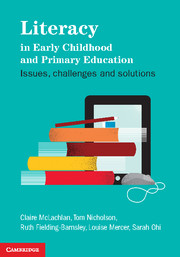Book contents
- Frontmatter
- Contents
- List of figures
- List of tables
- About the authors
- Acknowledgements
- Chapter 1 Introduction
- Part 1 Literacy acquisition: the child, the family and diversity in the modern world
- Part 2 Learning about literacy in early childhood settings
- Part 3 Literacy learning in the primary school
- Part 4 Literacy learning in the senior primary school
- Chapter 14 Extending reading and writing in the senior primary school: focus on factual writing
- Chapter 15 Struggling readers: issues and solutions
- Chapter 16 Conclusion
- References
- Index
- References
Chapter 14 - Extending reading and writing in the senior primary school: focus on factual writing
from Part 4 - Literacy learning in the senior primary school
- Frontmatter
- Contents
- List of figures
- List of tables
- About the authors
- Acknowledgements
- Chapter 1 Introduction
- Part 1 Literacy acquisition: the child, the family and diversity in the modern world
- Part 2 Learning about literacy in early childhood settings
- Part 3 Literacy learning in the primary school
- Part 4 Literacy learning in the senior primary school
- Chapter 14 Extending reading and writing in the senior primary school: focus on factual writing
- Chapter 15 Struggling readers: issues and solutions
- Chapter 16 Conclusion
- References
- Index
- References
Summary
Chapter objectives
To understand why factual reading and writing is more difficult than working with narrative texts.
To become familiar with successful strategies that will improve factual reading and writing in the senior primary school.
To be familiar with strategies teachers use to build vocabulary for reading and writing in the senior primary school.
To explain how to create and maintain positive attitudes to reading and writing.
This chapter moves from the discussion of reading and writing stories in the previous chapter to the reading and writing of factual works. These are not stories. The reading and writing of non-fiction, such as articles, reports and essays, is common in the senior primary school (Years 4–7). Pupils also encounter non-fiction in everyday reading material, such as magazines, newspapers, internet websites, Facebook, blogs, Twitter, and text messages on mobile phones.
What are the issues?
Survey data in New Zealand (Thomas & Ward 2010) indicate that students make rapid gains in reading and writing from Years 1 to 4 but this trend reverses after Year 4. The survey data used teacher ratings (‘overall teacher judgement’) of reading and writing in terms of whether children were at or above national standards, or below national standards. The survey sample was nationwide, made up of 3257 males and 3511 females.
- Type
- Chapter
- Information
- Literacy in Early Childhood and Primary EducationIssues, Challenges, Solutions, pp. 253 - 275Publisher: Cambridge University PressPrint publication year: 2012



